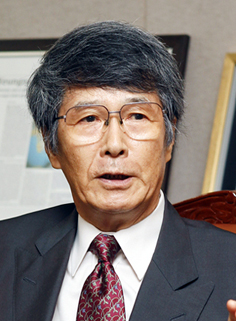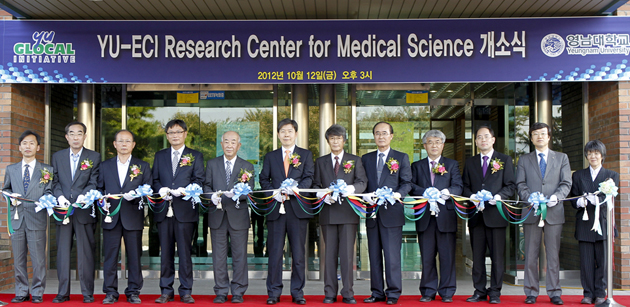YU attracts Japanese anti-cancer drug development venture company, ECI, and opens 'YU-ECI Research Center' on the 12th
Advanced equipment worth 12 billion won such as the world's only 'TAXIScan' is installed at the center
YU starts the development of US FDA approved '1st Korean anti-cancer drug' and artificial organs
[October 12, 2012]
 Real-time photo by TAXIScan of white blood cells attacking germs
Real-time photo by TAXIScan of white blood cells attacking germs
(shows process of white blood cells (neutroph) attacking and destroying germs with the passage of time) YU (president Lee, Hyo-soo) has begun full-scale development of the US FDA approved 'first Korean anti-cancer drug' and artificial organs. The first step to this was the 'YU-ECI Research Center' opening ceremony held at the YU Center for Research Facilities at 3pm on the 12th. The core research team of the Japanese listed venture company ECI (Effector Cell Institute), which deals with stem cells, opened up in YU.
This is basically an official declaration that it will not stop short in just basic research. YU-ECI Research Center will conduct clinical tests and pass the US FDA's approval procedures up to the stage of commercial sales in the global market. When this succeeds, the Korean medical industry centering on the 'YU-ECI Research Center' is expected to be equipped with sufficient competitive strength to enter the global bio industry market. The bio industry market is a 'blue ocean' that is expected to expand to 309 billion USD (343.2 trillion won) by 2015.

For the success of this project, YU appointed the founder of ECI, who is also a world-renowned scholar in the BT sector, and an honorary professor of University of Tokyo Medical Science, Kanegasaki Shiro (74, photo) as a chair professor of the YU Department of Nano, Medical and Polymer Materials. Professor Kanegasaki is
unrivaled in researching the development of next-generation anti-cancer and anti-inflammation drugs. After completing his post-doctorates course at Tufts University Medical School in the US, he worked as a visiting professor of the Max Planck Institute in Germany. In addition to his illustrious research background, he is still actively conducting research and published 152 papers in internationally prominent journals such as the top academic journals in immunology. In addition, he was awarded the Japanese Society for Bacteriology Award, Japanese Biochemical Society Award, and the International Society of Immunity Deficiency Award.
Recently, he developed a comprehensive next-generation anti-cancer medicine using the human immune system, and is conducting clinical tests simultaneously in the US and Japan. The first clinical test is scheduled to be completed by the end of 2012. Thus, there is a much higher possibility that the YU-ECI Research Center will successfully developed commercial new medicines within the next several years. It is expected that the new medicine will have an excellent effect in treating lung cancer, which is the 4th most frequent and 1st in death rate, as well as head and neck cancer, prostate cancer, uterine cancer, and breast cancer.
The YU-ECI Research Center will also begin developing artificial organs such as blood vessels, skin, urinary bladder and liver. It is also planning to develop and launch various medical instruments needed for research, as well as medicine development for incurable diseases such as diabetes and dementia. For this, the YU Polymer Gel Cluster Center (director Han Sung-soo, Department of Nano, Medical and Polymer Materials) that conducted preliminary research for several years will collaborate with two core researchers who worked together with Professor Kanegasaki for 10 years.
During this process, the advanced equipment worth over 12 billion won under the ownership of the YU-ECI Research Center is also expected to play a big role. 'TAXIScan', which was developed by Professor Kanegasaki, is a high-tech equipment that can monitor cell movement in real-time through special video treating processes. There is only one automated TAXIScan in the entire world.
YU President Lee, Hyo-soo stated, "The capacities of YU School of Medicine and College of Pharmacy, both of which have long traditions, will combine with the advanced engineering technologies of BT and IT to open new horizons and convergence and integrative research." He added, "In the near future, new medicine developed by the YU-ECI Research Center
will rewrite the history of conquering cancer."













